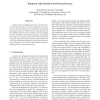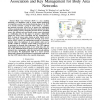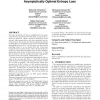139 search results - page 23 / 28 » Unconditionally Secure Key Agreement Protocol |
CSFW
2005
IEEE
14 years 1 months ago
2005
IEEE
A number of key establishment protocols claim the property of forward secrecy, where the compromise of a longterm key does not result in the compromise of previously computed sess...
TWC
2008
13 years 7 months ago
2008
Symmetric key agreement is significant to security provisioning in sensor networks with resource limitations. A number of pairwise key pre-distribution protocols have been proposed...
INFOCOM
2010
IEEE
13 years 4 months ago
2010
IEEE
Body Area Networks (BAN) is a key enabling technology in E-healthcare such as remote health monitoring. An important security issue during bootstrap phase of the BAN is to securely...
STOC
2010
ACM
13 years 11 months ago
2010
ACM
We study the problem of "privacy amplification": key agreement between two parties who both know a weak secret w, such as a password. (Such a setting is ubiquitous on th...
ACISP
2007
Springer
14 years 1 months ago
2007
Springer
We propose the first single sign-on system in which a user can access services using unlinkable digital pseudonyms that can all be revoked in case she abuses any one service. Our ...




